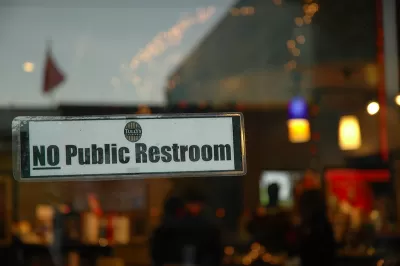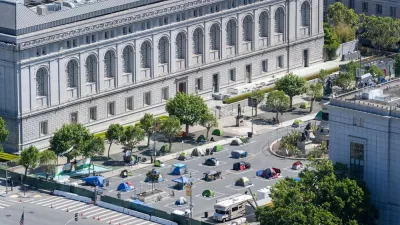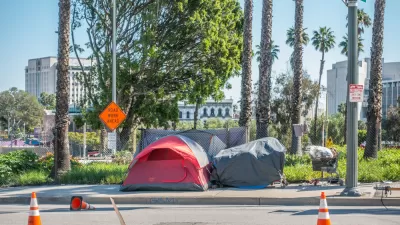For many people with chronic illnesses, access to public restrooms can be a critical medical issue. Incentivizing businesses to open their restrooms can fill a critical gap in U.S. cities.

In a piece for Bloomberg CityLab, Michael Osso and Marilyn G. Geller call for a new solution to the “great urban restroom shortage,” an issue Planetizen has highlighted before.
“Most of us have experienced the challenge of finding a public restroom, but for many, restroom access isn’t just a matter of convenience — it’s a serious medical issue,” the authors, respectively the president and CEO of the Crohn’s & Colitis Foundation and the Celiac Disease Foundation, argue. Since many U.S. cities lack adequate restroom facilities, Osso and Geller suggest that, in lieu of a targeted public investment in more public facilities, private businesses should open their restroom doors to the public, and governments should incentivize them to do so through direct payments or tax credits.
We expect the generosity of participating businesses to be fully paid back in the form of increased goodwill — and revenue, above and beyond any incentives. In fact, a recent Crohn’s & Colitis Foundation survey found that more than three-quarters of inflammatory bowel disease (IBD) patients stated that they were more likely to patronize a business if they could find their restrooms on a restroom finder app.
The authors point out that similar incentives to encourage businesses to comply with Americans with Disabilities Act (ADA) guidelines already exist, and restroom incentive programs are popular in Germany and the United Kingdom. Making more restrooms publicly available, they write, can benefit businesses and make cities easier to navigate for more people.
FULL STORY: How to Solve the Great Urban Restroom Shortage

Alabama: Trump Terminates Settlements for Black Communities Harmed By Raw Sewage
Trump deemed the landmark civil rights agreement “illegal DEI and environmental justice policy.”

Planetizen Federal Action Tracker
A weekly monitor of how Trump’s orders and actions are impacting planners and planning in America.

Why Should We Subsidize Public Transportation?
Many public transit agencies face financial stress due to rising costs, declining fare revenue, and declining subsidies. Transit advocates must provide a strong business case for increasing public transit funding.

Understanding Road Diets
An explainer from Momentum highlights the advantages of reducing vehicle lanes in favor of more bike, transit, and pedestrian infrastructure.

New California Law Regulates Warehouse Pollution
A new law tightens building and emissions regulations for large distribution warehouses to mitigate air pollution and traffic in surrounding communities.

Phoenix Announces Opening Date for Light Rail Extension
The South Central extension will connect South Phoenix to downtown and other major hubs starting on June 7.
Urban Design for Planners 1: Software Tools
This six-course series explores essential urban design concepts using open source software and equips planners with the tools they need to participate fully in the urban design process.
Planning for Universal Design
Learn the tools for implementing Universal Design in planning regulations.
Caltrans
Smith Gee Studio
Institute for Housing and Urban Development Studies (IHS)
City of Grandview
Harvard GSD Executive Education
Toledo-Lucas County Plan Commissions
Salt Lake City
NYU Wagner Graduate School of Public Service





























